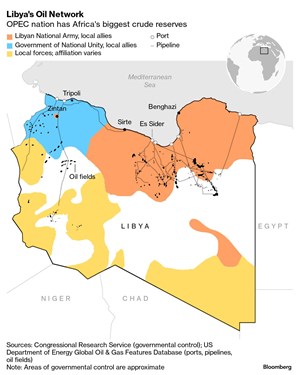Production shutdown from Libya's El-Feel oil field to escalate financial crisis, UN warns
(Bloomberg) – Libyan oil production dropped as authorities in the OPEC member’s east enforced a shutdown, escalating a crisis the United Nations warned runs the risk of collapsing the economy.
Production at the El-Feel field in southwestern Libya has stopped, according to people familiar with the matter, while local operators are indicating they’ll gradually halt pumping nationwide.
The move to freeze all production and exports announced Monday by the eastern Libyan authorities came in response to a decision by the internationally recognized government in the west to replace central bank Governor Sadiq Al-Kabir.
The country split into competing eastern and western governments a decade ago, and stewardship of the monetary authority gives control of billions of dollars of revenue. Libya — which sits atop Africa’s largest oil reserves — had been pumping about 1.2 MMbopd for much of the past year.
Libya has been wracked by unrest since the 2011 overthrow of longtime dictator Moammar Al Qaddafi, and its energy resources have been a key battleground for factions vying for political advantage, bringing frequent stoppages. Fighting that began around 2014 was supposed to end with a 2020 United Nations-backed cease-fire. Promised elections didn’t happen and Libya fractured anew.
Al-Kabir, who’s headed the central bank since 2011 and is backed by the east in his long-running personal feud with Tripoli-based Prime Minister Abdul Hamid Dbeibah, has resisted the decision to oust him. All the same, a government delegation entered the regulator’s headquarters in the capital on Monday to appoint fresh leadership.
Critics of Al-Kabir say he’s mishandled oil revenue. Eastern Libyans assert they’ve been historically marginalized during the country’s decades of independence, denying them a fair share of the wealth from national crude production that’s mainly centered in their region.
The UN mission in Libya warned against “unilateral actions” that “will come at a high cost for the Libyan people” and risk “precipitating the country’s financial and economic collapse.” It said it’s convening an emergency meeting with all parties to resolve the crisis, as it urged the immediate resumption of oil production.
While the government in western Libya has global recognition, its eastern rival has the backing of Khalifa Haftar, the leader of the self-styled Libyan National Army that’s the nation’s most powerful combat force and controls swathes of the east and south.
Haftar, in his first public comments since the crisis peaked, late Monday described moves to replace the central bank governor as “illegal measures taken by political parties that lacked legitimacy.”
In a bid to defuse the crisis, authorities in Tripoli on Tuesday urged the east to rejoin a UN-brokered agreement and work toward holding long-delayed nationwide elections by Feb. 17.



